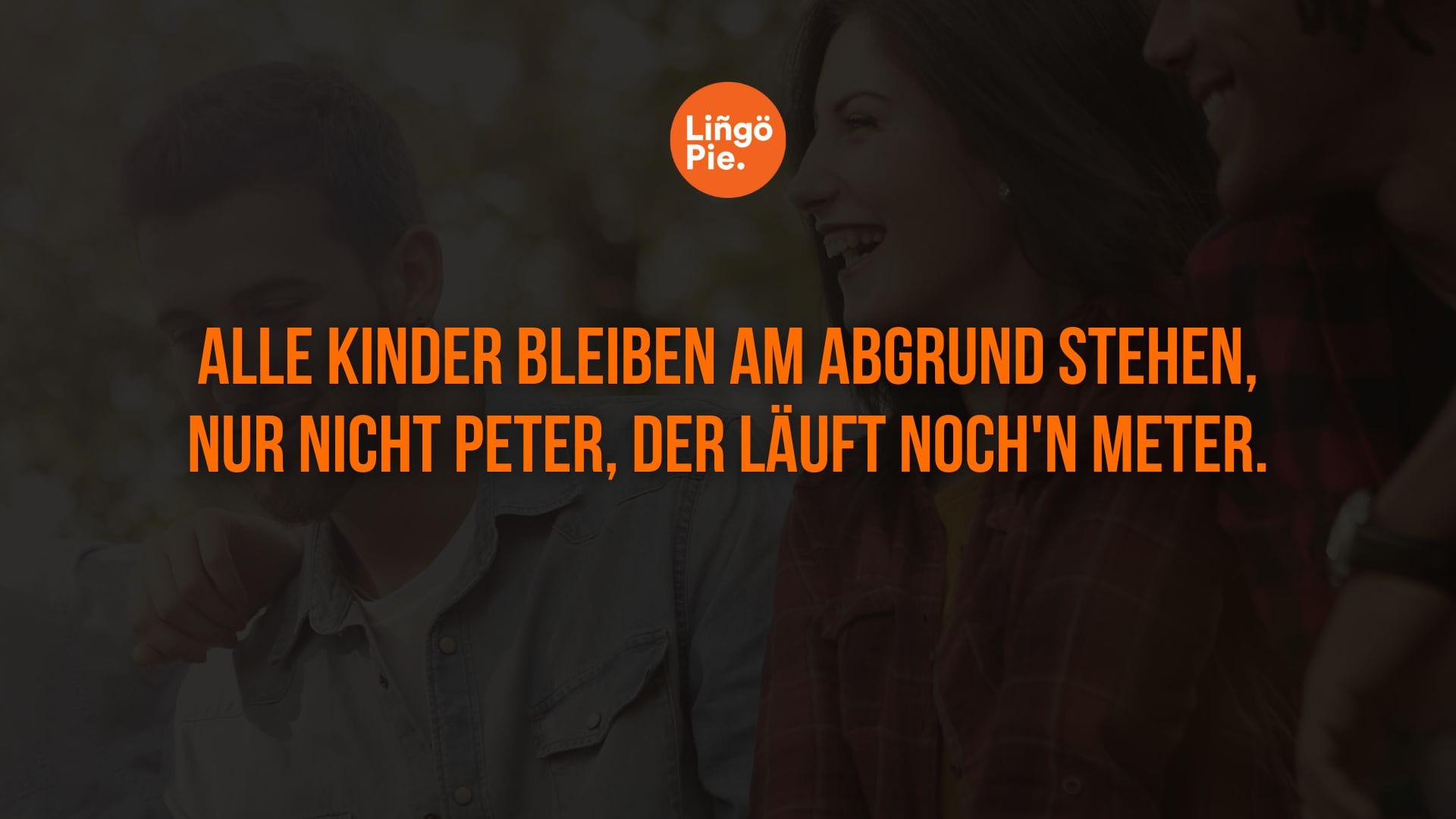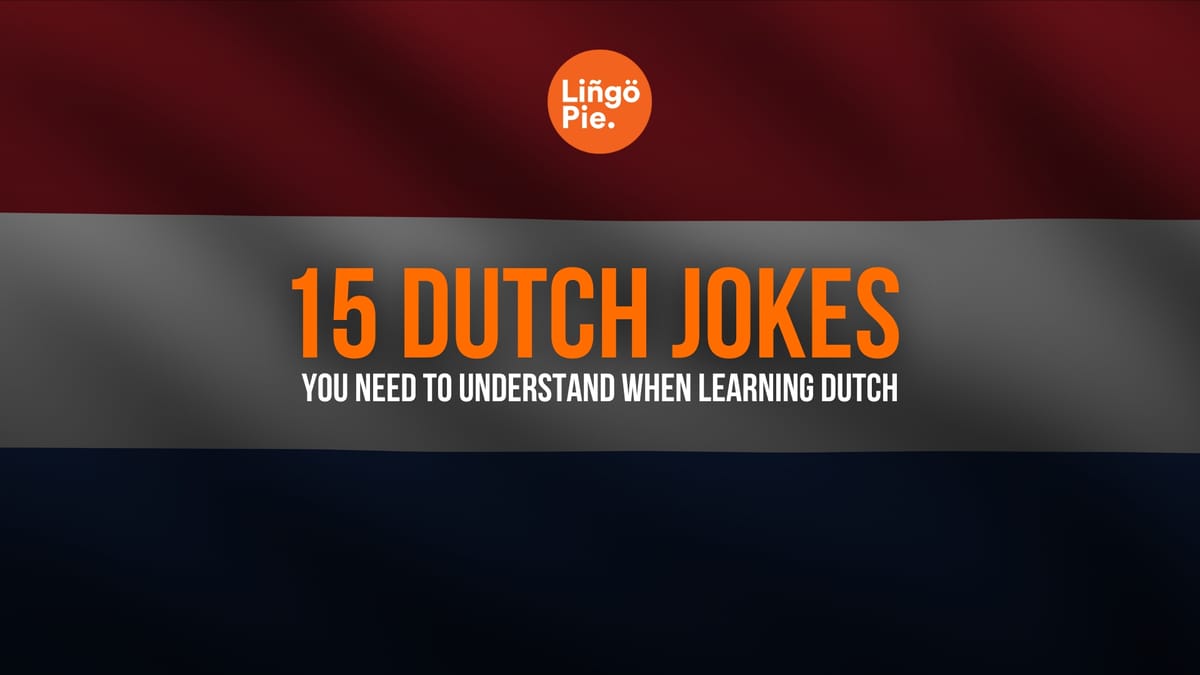Whoever said Germans don't have a sense of humor CLEARLY never hung out with actual Germans. Sure, they might not be rolling on the floor laughing at every dad joke, but trust me that once you crack the code of German humor, you'll realize these folks are hilarious in their own wonderfully weird way.
In this post, I'll share German jokes that can help language learners like you. If you understand them without needing translations, it's a clear sign your German skills are improving. I'll also explain how to use these jokes to boost your learning.
- Swiss German And German Language: 5 Major Differences
- How To Learn German Fast As A Beginner [Tips & Tricks]
- 10+ Easy German Short Stories For Beginners

How Do You Say "Joke" In German?
The most common word for "joke" in German is der Witz (plural: die Witze). You can also use der Scherz for a more playful joke or prank, and der Spaß when talking about fun or jest in general. When you want to tell a joke, you'd say "Ich erzähle einen Witz" (I'm telling a joke).
- "Das ist ein guter Witz!" (That's a good joke!)
- "Machst du Witze?" (Are you joking?)
- "Das soll wohl ein Witz sein" (That's supposed to be a joke, right?).
German also has the verb "witzeln," which means to joke around or make wisecracks—perfect for when you want to show off your German humor skills.
How Do You Laugh In German Through Text?
The most common German expression for laughter in text and online is "haha." You might also see "hihi" for a giggle, especially among younger people or women. For a hearty laugh, Germans write "hahaha" or even "ahahaha." Some might use "lol" (borrowed from English), though it's less common.
Germans also use asterisk expressions like "*grins*" (sometimes just "*g*") or "*lach*" which literally mean "grins" and "laughs.
15 Funny German Jokes In German
Was ist ein Keks unterm Baum?
Ein schattiges Plätzchen
Translation: What's a cookie under a tree? A shady spot/cookie.
"Plätzchen" denotes a small "spot" in the sense of a particular place, but it's also another word for cookie. So the answer works both ways: the cookie literally creates a "shady cookie" and figuratively sits in a "shady spot."

Da treffen sich zwei Jäger, aber nur einer fällt tot um
Translation: Two hunters meet, but only one falls down dead.
This is a classic German pun playing on the word "treffen" which has a double meaning of "to meet" and "to hit." So the joke can be read as "Two hunters meet each other" (normal meeting) or "Two hunters hit each other" (with bullets), explaining why only one falls dead.
Warum steht ein Pils im Wald?
Weil die Tannen zapfen
Translation: Why is there a beer in the forest? Because the firs are tapping/drawing.
This joke relies on the fact that Pils the beer and Pilz for mushroom sound identical. "Die Tannen zapfen" means "the fir trees are drawing beer", but it also sounds like "Tannenzapfen", the word for "pine cones".

Was sagt ein Krokodil, das einen Clown gefressen hat?
Schmeckt komisch!
Translation: What does a crocodile say after eating a clown? Tastes funny!
"Komisch" means both "funny" and "weird/strange" in German. So the crocodile is saying the clown tastes both "funny" (like humor) and "strange" (like flavor). This type of wordplay joke, called "Kalauer," is quite familiar to English speakers.
Mami, Mami, ich will nicht in die USA!
Sei ruhig und schwimm weiter.
Translation: "Mommy, mommy, I don't want to go to the USA!" – "Be quiet and keep swimming."
These jokes feature a short interaction between a child addressing either Mum or Dad with "Mami, Mami" or "Papi, Papi" and a question or observation. The dark humor here is that instead of taking a plane, they're apparently swimming across the Atlantic.
Lehrer: 'Wo wurde der Friedensvertrag von 1806 unterschrieben?'
Fritzchen: 'Unten rechts?'
Translation: Teacher: "Where was the peace treaty of 1806 signed?" Little Fritz: "Bottom right?"
"Fritzchen" is a mischievous character who is more witty than bright. He's not always the butt of the joke, as he often has clever comebacks to questions from his teacher or his parents. Instead of answering the historical location, Fritz interprets "where" as the physical location on the document—bottom right corner where signatures go.

Alle Kinder bleiben am Abgrund stehen, nur nicht Peter, der läuft noch'n Meter.
Translation: All children stop before the gorge, only Peter walks another meter.
"Alle Kinder" jokes feature a rhyme and are therefore difficult to translate. The setup and structure of these jokes are always the same: all children are doing something, only one kid is singled out, then the punch line has to rhyme with that kid's name. The humor is typically dark, resulting in a bad fate for that one child. Poor Peter—his name rhymes with "Meter," sealing his fate over the cliff.
Was ist der Unterschied zwischen einem Storch?
Beide Beine sind gleich lang, besonders aber das linke.
Translation: What's the difference between a stork? Both legs are the same length, especially the left one.
These jokes are similar to "Kalauer", but instead of a pun, they have an absurd punchline. The element of surprising the listener is more important than making them laugh. In essence, these jokes are so stupid you're stumped. The question doesn't make sense (difference between a stork and what?), and the answer is equally nonsensical.
Zwei Männer gehen durch die Wüste.
Sagt der eine: 'Lass mich mal in die Mitte.'
Translation: Two men are walking through the desert. Says one: "Let me walk in the middle."
Two men are walking through the desert. Says one: "Now let me walk in the middle." The joke's absurdity is perfect: there are only two people, so there is no "middle." It's another example of German "Antiwitze" that make you laugh at their complete illogic.

Was passiert mit einem roten Stein, der ins Schwarze Meer fällt? Er wird nass.
Translation: What happens if you drop a red stone into the Black Sea? It gets wet.
These are a special kind of questions that seem like a riddle, but the obvious answer is poking fun at the person who has been asked. You expect some clever wordplay about colors, but the answer is utterly practical and obvious: stones get wet when dropped in water, regardless of which sea.
Warum können Geister nicht lügen?
Weil sie so leicht zu durchschauen sind.
Translation: Why can't ghosts lie? Because they are so easy to see through.
"Durchschauen" can mean both "to see through" (literally, since ghosts are transparent) and "to see through someone's lies" (figuratively). It's a perfect German pun that works on both the literal ghost characteristic and the idiomatic expression for detecting lies.
Trinkt der Bauer und fährt Traktor, wird er zum Gefahrenfaktor.
Translation: If the farmer drinks and drives his tractor, he becomes a danger factor.
Traditionally, "Bauernregeln" were lore passed on by farmers in rhyme and often concerned a fact about the weather. Today, these jokes not only poke fun at farmers in other ways, but they can also be about anything as long as they feature the same rhyming pattern.

Was macht man mit einem Hund ohne Beine? Um die Häuser ziehen.
Translation: What do you do with a dog with no legs? Pull it around the block.
"Um die Häuser ziehen" literally means "to pull around the houses", which is what walking a dog with no legs would look like; but it's also an expression for being "out on the town" or for dragging oneself to go outside. The dark humor combines the literal action of dragging a legless dog with the idiomatic expression for partying.
Was ist grün und dreieckig? Ein grünes Dreieck!
Translation: What's green and triangular? A green triangle!
This is an "antiwitz" (anti-joke) that is intentionally mundane or straightforward, deliberately leading the listener to expect a punchline only to deliver an unexpectedly simple or literal conclusion. Sometimes the most obvious answer is the funniest answer—or at least makes you groan the loudest.
Warum nehmen Seeräuber keinen Kreis? Weil sie Pi raten!
Translation: Why don't pirates take a circle? Because they pi-rate!
"Seeräuber" (sea raiders or sea robbers) is a synonym for pirates, which gives the joke its punny effect. "Pi raten" sounds like "Piraten" (pirates), and since pi (π) is associated with circles, the joke creates a silly reason why pirates wouldn't want circles. It's a mathematical pun that works in both German and English, showing that some humor translates across cultures.
- 15 Dutch Jokes You Need To Know When Learning Dutch
- 9 Chinese Jokes That Made Me Feel Fluent In Chinese
- 101 Best Puns And Jokes In Spanish That'll Make You LOL
How To Learn German From These Jokes
German jokes are perfect for learning because they force you to understand language patterns. To learn from them, break down each one to see what makes it tick. This helps you understand how Germans think about language and humor.
- Say the jokes out loud to practice pronunciation
- Memorize 3-4 favorites to use in conversations
- Look up every word you don't know completely
- Try creating your own versions using the same patterns
- Ask German speakers to explain ones you don't get
Ready to hear these jokes in real life? Watch German TV shows like "How to Sell Drugs Online," or movies like "Christmas Crossfire." You'll hear how Germans actually tell jokes and notice their delivery and the German expressions they use. Plus, you'll discover that German humor is way more varied than you thought.
Take Your German Humor Learning Further with Lingopie
Now that you've got a taste of German humor, imagine watching German shows and movies where you can actually understand the jokes as they happen. Well, now you don't have to cling on to that imagination because of Lingopie.
Lingopie is a language learning platform lets you watch authentic German content with interactive dual subtitles, so when a character drops a "Was ist..." joke or makes a clever pun, you can instantly click on words you don't know and see their meanings without pausing the fun.
Curious? Give Lingopie a try and discover just how funny German really gets when you understand every word.









